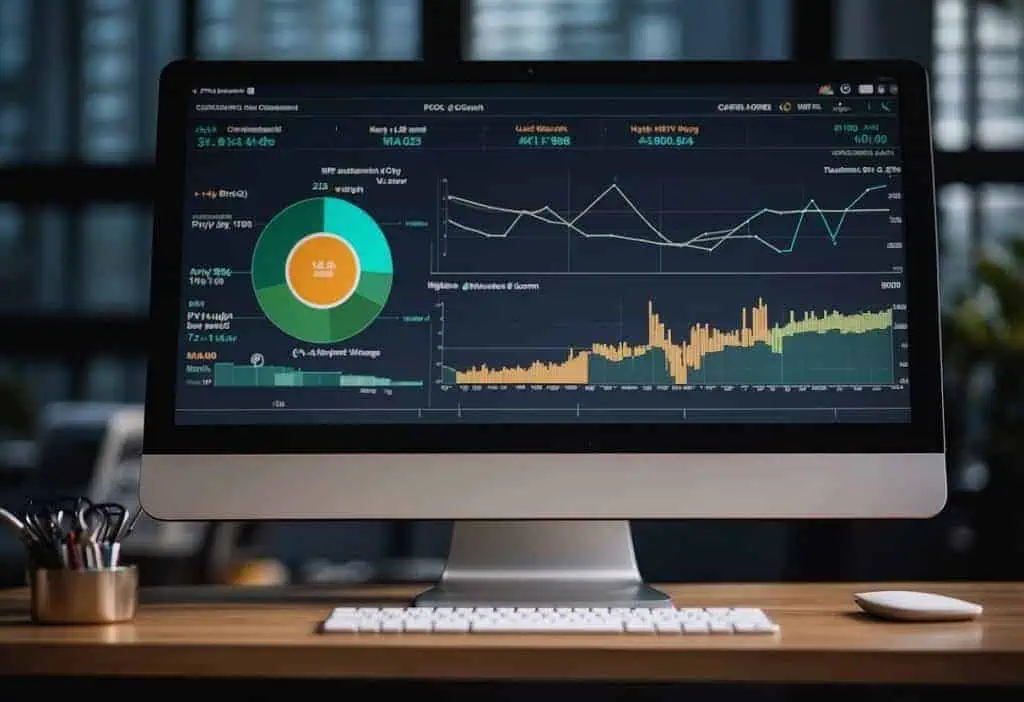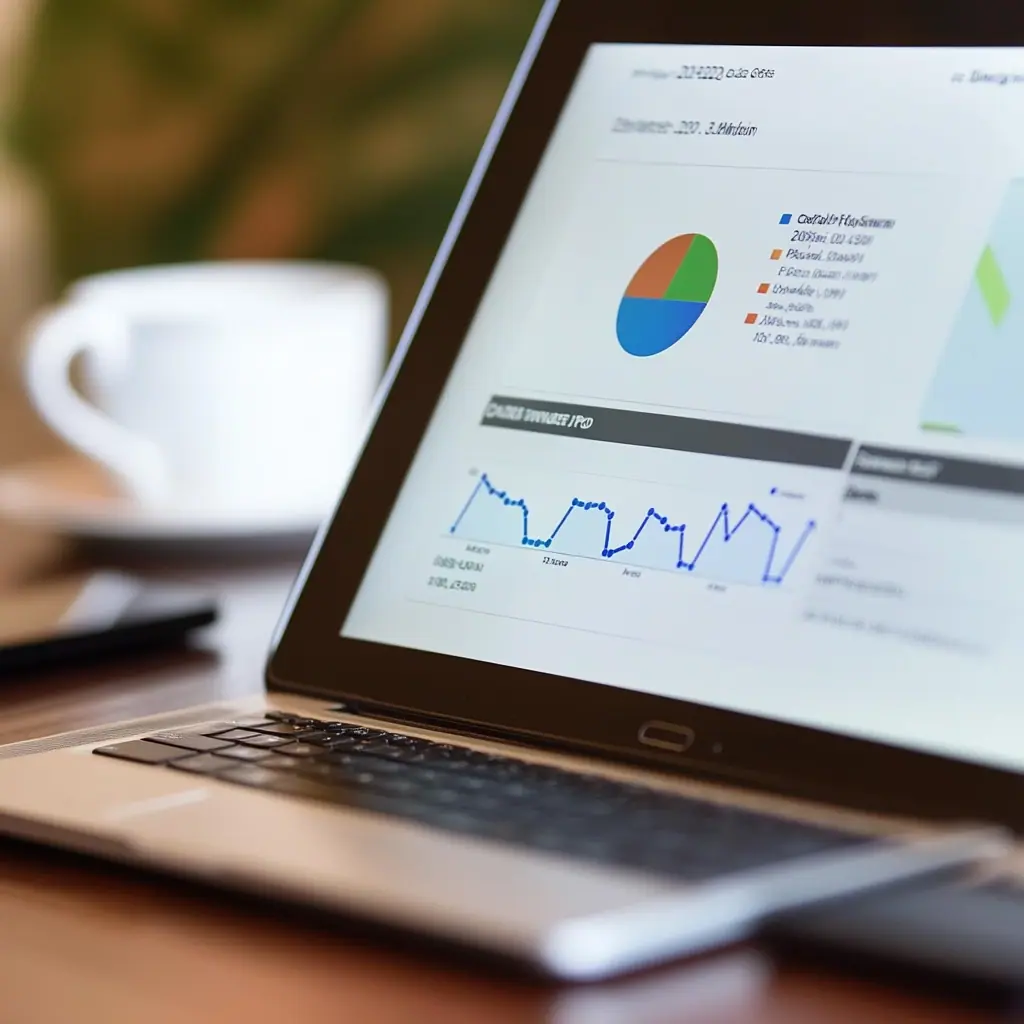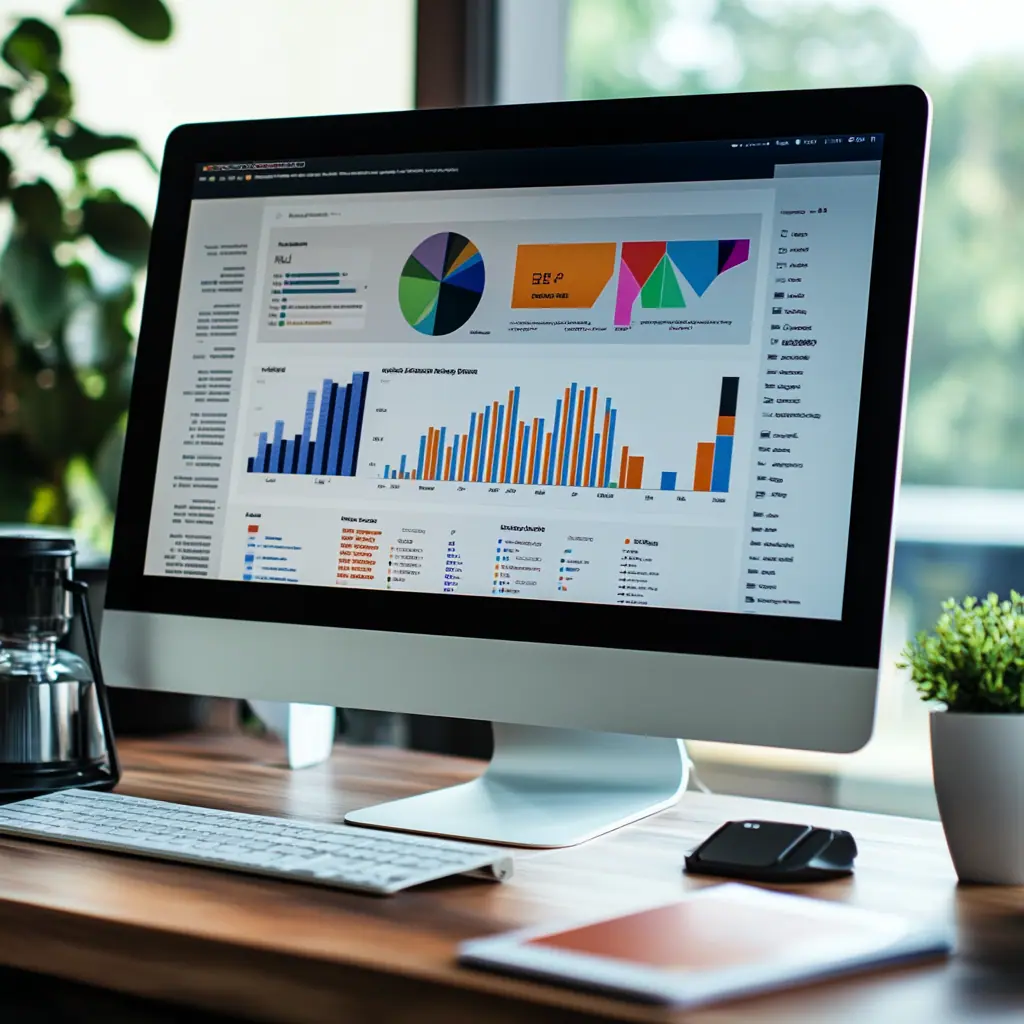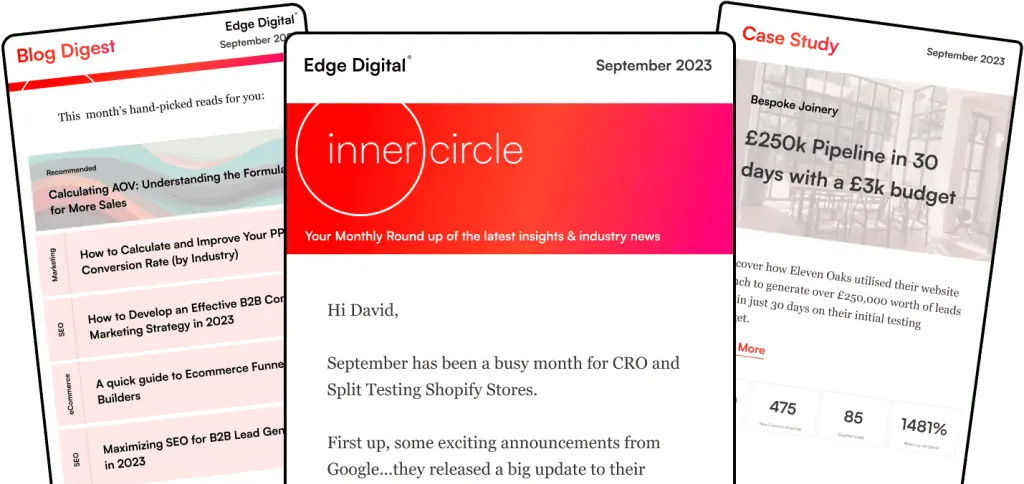Pay-Per-Click (PPC) intelligence is transforming digital advertising. It incorporates data and insights to supercharge our campaigns. By leveraging PPC intelligence, we can make smarter decisions that boost our ad performance and outshine our competitors.

Boosting knowledge and intelligence to out perform competitors
Imagine having the ability to refine keywords, enhance landing pages, and craft compelling ad copy with precision. That’s what PPC intelligence offers. It’s all about leveraging real-time analytics and competitive analysis to reach the right audience at the right time.
For businesses aiming to drive traffic and maximise conversions, PPC intelligence is a game-changer. It empowers us to take control of our advertising strategies and achieve measurable results. Dive into the world of PPC intelligence and learn how you can elevate your digital marketing efforts.
Key Takeaways
PPC intelligence enhances ad performance through data-driven insights.
Competitive analysis and real-time analytics are crucial.
PPC intelligence helps us target the right audience effectively.
Understanding PPC Intelligence

Using the data to make smarter decisions
PPC intelligence involves using data and technology to make smarter decisions in online advertising. By analysing data, we can fine-tune pay-per-click (PPC) campaigns and stay ahead in the competitive landscape.
Defining PPC Intelligence
PPC intelligence, short for Pay-Per-Click intelligence, is a method of using data analytics to enhance the effectiveness of digital marketing campaigns. Instead of guessing which ads will perform well, we use detailed data analysis to make decisions.
This approach includes studying user behaviour, tracking performance metrics, and using algorithms and machine learning. By analysing this data, we can determine which ads are most effective and adjust our strategies accordingly. Understanding PPC intelligence lets us create more targeted and efficient advertisements, leading to better results and a higher return on investment (ROI).
The Role of PPC Intelligence in Digital Marketing
In digital marketing, PPC intelligence plays a critical role in shaping our strategies and tactics. By leveraging tools that provide insights into consumer behaviour and competitor actions, we can make data-driven decisions that improve campaign performance. Effective advertising campaigns are essential for optimizing PPC operations, as they benefit from techniques like PPC intelligence and competitor keyword gap analysis.
With PPC intelligence, we can perform competitive intelligence to understand our rivals’ strategies. These insights help us to adjust our bids, choose the right keywords, and create better ad content. Furthermore, we can use real-time data to optimise our campaigns dynamically, ensuring that we stay adaptive and relevant.
Using data-driven decisions enables us to allocate our budgets more efficiently and target the right audiences, enhancing the overall effectiveness of our online advertising efforts.
Fundamentals of PPC Campaigns
Understanding the fundamentals of PPC campaigns is crucial for success. We will dive into the key components and steps for setting up a successful PPC campaign.
Key Components of PPC Campaigns
Keywords: Keywords are the backbone of PPC campaigns. Keyword research tools are essential for identifying relevant keywords that target audiences use when searching for products or services. Choosing the right keywords helps us target the audience effectively and drive relevant traffic.
Ad Copy: Crafting compelling ad copy is essential. The ad must be clear, engaging, and encourage users to click.
Landing Pages: A well-designed landing page is critical for conversions. It should provide a seamless user experience and align with the ad copy.
Budget: Setting a realistic budget ensures we can manage costs while achieving the desired ROI. We should monitor and adjust our budget regularly.
Bid Management: Effective bid management helps us maximise ROI. We need to balance between competitive bid prices and staying within budget.
Analytics and Tracking: We must utilise analytics to track performance. Monitoring metrics like click-through rates, conversions, and ROI helps in refining campaigns.
Setting Up a Successful PPC Campaign
Identify Goals: The first step is to identify what we aim to achieve, such as increased traffic, conversions, or brand awareness.
Keyword Research: Conduct thorough keyword research to find relevant terms that our target audience uses. Tools like Google Keyword Planner can assist in this.
Create Ad Groups: Organise keywords into ad groups to create focused and relevant ad campaigns. Each ad group should have a clear theme.
Write Ad Copy: Develop compelling ad copy that is clear, concise, and aligned with the target keywords. Effective ad copy increases click-through rates.
Design Landing Pages: Ensure our landing pages are optimised for conversions. They should be user-friendly and match the promise of the ad.
Set Budgets and Bids: Define our budget and bid amounts. It’s crucial to balance competitiveness with staying within financial limits.
Launch and Monitor: Launch the campaign and monitor performance closely. Use analytics tools to track metrics and make necessary adjustments to improve results.
In-Depth PPC Strategies

Get the most out of your PPC campaigns by learning from the data
Effective PPC intelligence focuses on developing strong keyword strategies, optimising ad copy and landing pages, managing budget allocation, and continuously improving through A/B testing. Each of these elements is crucial in maximising the effectiveness and efficiency of PPC campaigns.
Developing Keyword Strategies
We begin with thorough keyword research. Ad platforms play a crucial role in this process, as each platform offers unique features that allow us to tailor our campaigns to specific goals and audience preferences. By identifying keywords that potential customers are using, we can target our ads more effectively. Utilising tools like Google Keyword Planner helps us find search volumes, competition levels, and cost-per-click estimates.
Long-tail keywords are often less competitive and more cost-effective. We regularly update our keyword list based on performance data and emerging trends.
Incorporating negative keywords also ensures that our ads don’t show for irrelevant searches, saving budget and improving click-through rate.
Budget Allocation and Bid Management
Setting the right budget is critical to our PPC success. Advertising intelligence plays a crucial role in enhancing client management and performance reporting within our advertising campaigns. Using historical data, we estimate a daily or monthly budget that aligns with our goals. Google Ads and other platforms provide tools to help manage bids efficiently.
We often use automated bidding strategies like Target CPA (Cost Per Acquisition) or Target ROAS (Return on Ad Spend) for better results. Constantly monitoring and adjusting bids allows us to allocate our budget to high-performing keywords and ad groups.
Budget reallocation based on performance ensures we are spending wisely. We should always look at click-through rates and conversion rates to decide where to invest more heavily.
Optimising Ad Copy and Landing Pages
Ad copy should be compelling and relevant to encourage clicks. Each ad needs to highlight unique selling points and include a clear call to action. We A/B test different headlines, descriptions, and calls to action to see what resonates best with our audience.
Landing pages must match the ad’s promise and provide a seamless user experience. This includes having a clear value proposition, easy navigation, and fast loading times. A well-optimised landing page significantly boosts conversion rates.
Regularly updating ad copy and landing pages can adapt to market changes, competitor strategies, and new insights from data analysis.
A/B Testing and Continuous Improvement
A/B testing involves comparing two versions of an ad or landing page to determine which performs better. Understanding the competitive landscape and analyzing rivals’ strategies, including keywords and ad copy, is essential for successful PPC advertising. This process is ongoing and essential for continuous improvement. We test variations in headlines, images, ad copy, and call-to-action buttons.
Through A/B testing, we can identify what drives higher click-through rates and conversions, allowing us to refine our strategies. It’s important to test one element at a time for clear results.
Continuous improvement means we are always looking for ways to enhance our campaigns. We rely on performance metrics and feedback loops to make data-driven decisions that keep our PPC tactics sharp and effective.
Advanced Analytical Tools
In digital marketing, advanced analytical tools are crucial for gaining a competitive edge, integrating data analytics into operations, and leveraging automation and machine learning for PPC campaigns.

By using analytical tools you will get better performance for your ppc campaigns
Leveraging PPC Tools for Competitive Advantage
Using PPC tools allows us to stay ahead of the competition. PPC intelligence empowers marketers by providing them with actionable insights and data-driven analyses to enhance their advertising strategies. Tools like Google Ads and SEMrush provide insights into market trends and competitor strategies.
We can track competitor keywords and ad performance to adjust our campaigns. By understanding their bidding strategies and keyword selection, we can make informed decisions to outperform them. These tools also help identify gaps in our approach, ensuring we target untapped opportunities.
Integrating Analytics into Your PPC Efforts
Integrating analytics into our PPC efforts is essential for measuring success and adjusting strategies. Advanced analytics provide a deeper insight into campaign performance, user engagement, and ROI. For example, tools like Ahrefs and Google Analytics offer detailed metrics on click-through rates and conversion rates.
By analysing these metrics, we can pinpoint what works and what doesn’t. We can also set up custom reports to track specific goals. Continual monitoring allows us to fine-tune our campaigns in real-time to enhance performance and efficiency.
Automation and Machine Learning in PPC
Automation and machine learning play a pivotal role in modern PPC strategies. Tools such as Google’s Keyword Planner and various PPC management software use machine learning to predict trends and optimise bids automatically. This reduces manual effort and increases accuracy in targeting.
Automation helps in scheduling ads and managing budgets effectively. It ensures that our campaigns run seamlessly, even without constant oversight. Machine learning, on the other hand, refines these strategies by learning from past data, continuously improving targeting and performance.
Using these tools, we can focus more on strategic planning while the software handles the repetitive tasks, boosting our overall productivity and campaign success.
Performance Metrics and KPIs
When managing PPC campaigns, it’s crucial to track specific metrics and KPIs to gauge success and guide strategic decisions. These metrics include click-through rate (CTR), cost per click (CPC), and conversion rate.
Key Performance Indicators for PPC Campaigns
Click-Through Rate (CTR): CTR is a valuable metric that shows how often people click on our ads after seeing them. A high CTR indicates effective ad copy and targeting. We calculate it by dividing the number of clicks by the number of impressions, then multiplying by 100.
Cost Per Click (CPC): CPC measures the average cost for each click on our advertisements. It helps us understand the financial efficiency of our campaigns. To determine CPC, we divide the total cost of clicks by the total number of clicks.
Conversion Rate: Conversion rate tells us the percentage of users who complete the desired action after clicking our ad. It can involve signing up for a newsletter, making a purchase, or downloading a resource. A higher conversion rate suggests that our ad and landing page are highly effective.
Interpreting PPC Analytics for Strategic Decisions
By analysing PPC data, we can refine our strategies. High CPC may suggest the need to adjust keyword bids or improve ad relevance. Low conversion rates might indicate problems with our landing page or offer.
To get a detailed insight, we use various tools and dashboards. Regular data analysis helps us spot trends and make data-driven decisions. For instance, a low CTR may point to irrelevant ad copy, which we can then tweak for better performance.
Furthermore, examining impression share can highlight how well our ads perform compared to competitors’. It’s a percentage of the times our ads were shown out of the total possible impressions. This helps in understanding our ads’ visibility and making adjustments to bid strategies for improved reach.
Market and Competitor Insights

learning the market: what your competitors and doing that your arent.
In this section, we explore how to understand the competitive landscape, perform competitor analysis, and recognise opportunities and gaps to enhance our PPC strategies.
Understanding the Competitive Landscape
To understand the competitive landscape, we need to gather data on our market and competitors. We explore their advertising strategies, campaign duration, and budget allocation. This involves monitoring competitor ads and keywords to identify trends and performance metrics.
Utilising PPC tools can provide valuable auction insights. These insights help us see which keywords are most contested and which ads are gaining traction. Recognising industry trends allows us to adjust our strategies and stay competitive.
Additionally, understanding the broader market context and economic factors affecting our industry can fine-tune our campaigns. By being well-informed, we can anticipate shifts and maintain an edge over our competitors.
Competitor Analysis and Benchmarking
Competitor analysis and benchmarking involve detailed examination of our rivals’ PPC activities. We start by identifying key competitors and their approaches. Examining their keywords, ad copy, and landing pages offers insights into what works for them.
Using tools to track competitor ads enables us to see their performance over time. We can benchmark against their best practices, identifying where our campaigns fall short. Compiling data on click-through rates, conversion rates, and ad spend helps us find areas for improvement.
Having these benchmarks allows us to set realistic goals and optimise our PPC strategies more effectively. By continuously assessing our performance against competitors, we can refine our efforts and achieve better results.
Recognising Opportunities and Gaps
Recognising opportunities and gaps is crucial for developing a strong PPC strategy. Analysing competitors’ weaknesses and strengths helps us find areas they may have overlooked. We can identify untapped keywords or segment markets they haven’t targeted.
Using competitive PPC intelligence tools, we can discover market trends and shifts in consumer behaviour. This enables us to adjust our campaigns proactively. For instance, if a competitor is not capitalising on a trending keyword, we can seize that opportunity.
Recognising these gaps and opportunities not only allows us to optimise our current campaigns but also helps us innovate and stay ahead in the dynamic landscape of digital advertising.
Leveraging Audience and User Behaviour
To get the best results from PPC intelligence, we need to strategically target our audience and analyse user behaviour. This helps us drive more targeted traffic and improve overall engagement, leading to better conversion rates and higher-quality leads.
Targeting the Right Audience
Targeting the right audience is essential for effective PPC campaigns. We use AI algorithms to identify and target specific audiences based on their behaviour, interests, and demographics. This allows us to tailor our ads to people who are most likely to be interested in our products or services.
By using relevant keywords and demographic data, we can narrow down our target market. For example, if we’re selling running shoes, we target users interested in fitness, running, and sports. This ensures our ads are seen by those who are genuinely interested, increasing our chances of conversion.
We also use lookalike audiences to reach people similar to our current customers. This expands our reach to potential new customers while keeping the ads relevant. Utilising these strategies helps us optimise ad spend and achieve better returns on our investment.
Analysing User Behaviour for Better Engagement
Analysing user behaviour is crucial for enhancing engagement and refining our PPC campaigns. We track metrics such as click-through rates (CTR), time spent on page, and conversion rates to understand how users interact with our ads and landing pages.
By examining these behaviours, we identify patterns and preferences that inform our strategy. For instance, if users are leaving our landing page quickly, it may indicate a need for clearer calls to action or more engaging content.
We also utilise data on user behaviour to retarget ads. For example, if someone visits our site but doesn’t make a purchase, we can retarget them with ads that offer a special discount to entice them back. This keeps our brand top-of-mind and encourages users to complete their purchase.
Using AI tools, we can analyse vast amounts of data quickly and efficiently, allowing us to make data-driven decisions that enhance user engagement and drive better results from our PPC campaigns.
Optimisation Tactics for PPC
We will explore specific strategies to improve your PPC advertising. By focusing on essential elements like search volume, keyword research, and ROI, you can ensure effective ad spend and increased performance.

keyword research is key. Using different tools to track performance is also paramount.
Search Volume and Keyword Research
Identifying the right keywords is key to PPC success. We should use tools like Google Keyword Planner to find relevant keywords. This includes looking at search volume and competition. Targeting long-tail keywords can be beneficial as they are often less competitive but highly targeted.
It’s crucial to regularly review our keyword list. We need to remove keywords that drive irrelevant clicks and aren’t converting. Negative keywords help in this process by filtering out non-relevant search terms that cost money but bring no value.
In addition, keyword analysis should be ongoing. Insights from tools, search term reports, and performance data help us refine our strategy constantly. This way, we can stay ahead in the PPC game and ensure we’re targeting the right audience.
Fine-Tuning Campaigns for Higher ROI
To maximise ROI, refining our PPC campaigns is essential. One tactic is to use manual bidding. This allows us to have better control over our bids, ensuring we’re not spending too much on low-value clicks. Bidding strategies should align with our campaign goals, whether it’s increasing website traffic or driving sales.
Ad copy refinement is another crucial aspect. Continuously test different ad texts to see which performs best. By doing so, we can improve click-through rates and conversion rates. We must make sure our ads are clear, engaging, and relevant to the keywords we bid on.
Reviewing our ad placements is also vital. Ensuring our ads are displayed on high-quality sites where our target audience is likely to visit can greatly improve our visibility and performance. This includes monitoring performance metrics and adjusting accordingly.
By focusing on these tactics, we can fine-tune our campaigns for better returns.
Future of PPC Advertising
As we look forward, the future of PPC advertising shows promising developments with innovative trends and technologies shaping digital marketing.
Emerging Trends in Digital Marketing
One notable trend is the increased use of Artificial Intelligence (AI) in PPC advertising. AI helps analyse vast amounts of data quickly, allowing us to identify potential customers more accurately. This technology enhances the precision of our ad targeting, making campaigns more effective and resource-efficient.
Voice search optimisation is another significant trend. As voice assistants become more mainstream, optimising PPC ads to capture voice search queries can help us increase our online presence. This shift requires changes in keyword strategies to include natural language and conversational phrases.
Finally, video ads are gaining prominence. Video formats engage users more effectively than text-based ads, leading to higher click-through rates and better user engagement. Embracing video ads can boost our digital advertising efforts significantly.
Innovations in PPC Technology and Strategies
AI and machine learning are revolutionising PPC campaign management. Automated bidding strategies are now more sophisticated, finding the optimal bids for ad placements without manual intervention. This automation saves time and maximises our return on investment.
Demand Generation campaigns are also emerging as a powerful tool. These campaigns focus on creating awareness and interest in our products or services rather than just responding to existing demand. They can help us attract new customers by expanding our reach.
Innovations like responsive search ads adapt their format based on user behaviour. By testing different headlines and descriptions, these ads improve relevance and performance over time. Incorporating such innovations into our PPC strategies can lead to more impactful and effective online marketing campaigns.
Frequently Asked Questions
PPC intelligence tools can significantly boost campaign outcomes by providing insights into key metrics, integrating AI for better management, and helping optimise ad spend. Advertisers should be aware of the benefits and considerations when choosing a platform.
How can PPC intelligence tools enhance campaign performance?
PPC intelligence tools offer the ability to track and analyse keyword data, competition, and user intent. By leveraging these tools, we can refine targeting and bidding strategies. This, in turn, allows for more effective and efficient campaigns.
What are the key metrics to monitor in PPC intelligence software?
The critical metrics include click-through rates (CTR), cost per conversion, and quality scores. Monitoring these metrics helps us assess the effectiveness of our campaigns. By focusing on these data points, we can identify trends and make adjustments as needed.
How does artificial intelligence contribute to PPC management?
Artificial intelligence plays a significant role in PPC management by analysing vast amounts of data quickly. It helps in automating bidding strategies and predicting user behaviour. This allows us to make more informed decisions and improve campaign results.
What are the benefits of integrating PPC intelligence into digital marketing strategies?
Integrating PPC intelligence into our digital marketing strategies provides several benefits. It enhances our ability to reach targeted audiences and generate better leads. Furthermore, using these tools allows for continuous optimisation and growth in campaign performance.
What should advertisers consider when choosing a PPC intelligence platform?
Advertisers need to consider the platform’s ability to provide actionable insights, ease of use, and integration with existing tools. It’s also essential to evaluate the support and resources available. These factors will ensure that we can maximise the potential of our PPC campaigns.
How does PPC intelligence assist in optimising ad spend?
PPC intelligence tools help optimise ad spend by providing data-driven insights. They allow us to allocate our budget more effectively, focusing on high-performing keywords and strategies. This ensures that we get the best return on investment for our advertising efforts.



